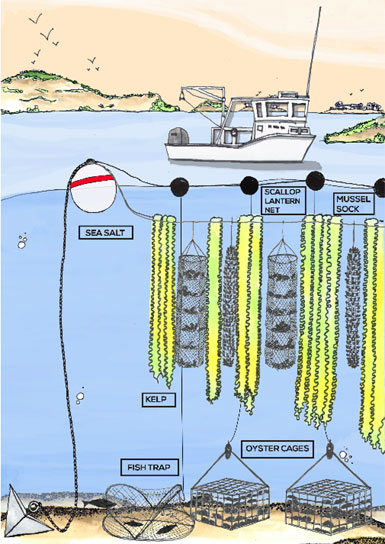Greenwave, a nonprofit that’s developing the world’s first ecologically sustainable ocean farms, has won this year’s Buckminster Fuller Challenge – the ultimate award for socially responsible design.
The winner reflects one of Bucky’s mottos: "You never change things by fighting the existing reality. To change something, build a new model that makes the existing model obsolete."
GreenWave’s goal is to restore ocean ecosystems, while providing jobs by turning fisherman into "restorative ocean farmers."
GreenWave’s "vertical underwater garden" shifts the practice of monoculture aquaculture to multi-species 3D ocean farms – vibrant ecosystems that also produce higher yields. The infrastructure is simple: seaweed, scallops and mussels grow on floating ropes, stacked above oyster and clam cages below.

From these crops, ocean farmers can produce food, fertilizers, animal feeds, pharmaceuticals, cosmetics, biofuels and much more. The farms filter pollutants out of water, sequester carbon, support biodiversity, and are thus designed to restore rather than deplete our ecosystems.
A single acre filters millions of gallons of ocean water every day, creates homes for hundreds of wild marine and bird species and absorbs the overabundance of nitrogen and carbon (with kelp sequestering 5x more carbon than land based-plants) that are killing billions of organisms. The design requires zero-inputs-there is no need for fresh water.
Greenwave describes the benefits:
-
More Biodiversity, Higher Yields: By using the entire food column, the "farm" provides habitat for hundreds of marine and bird species, and create natural reef systems. It can grow 20 tons of sea vegetables and 500,000 shellfish on each acre per year.
-
Zero Inputs: Since there is no need for fresh water, fertilizer, or pesticides, restorative ocean farming is the most sustainable form of food production on the planet.
Nitrogen pollution causes algae blooms that lower oxygen levels as they decompose, causing dead zones. Greenwave’s farms sequester nitrogen, preventing algae blooms.
-
Food Security: As a food crop, seaweed is rich in nutrients such as protein, calcium, and vitamin-C. Studies demonstrate that a network of seaweed farms the size of Washington State could produce all of the dietary protein needs of the human population.
Kelp absorbs 5 times the carbon as land-based plants and the farms create storm barriers that mitigate the impacts of storms.
-
Energy Security: a network of farms totaling an area half the size of Maine could grow enough biofuel to replace all the oil used in the US, according to the Department of Energy.
Greenwave’s approach gives us a scalable, integrated model that coastal fishing communities around the world can adopt with modest infrastructure costs and begin to build towards a long-term resilient future," says Elizabeth Thompson, Executive Director of BFI.
The winner receives $100,000 to support their work.
Previous awards went to Living Breakwaters – a climate resilience project in NYC – the Living Building Challenge and Operation Hope, which restores degraded ecosystems.
Read our articles, Is Certified Organic Farmed Fish Possible? USDA Thinks So and A Quiet World Milestone: Farmed Fish Production Overtakes Beef.
BFI is accepting nominations for the 2016 award:
